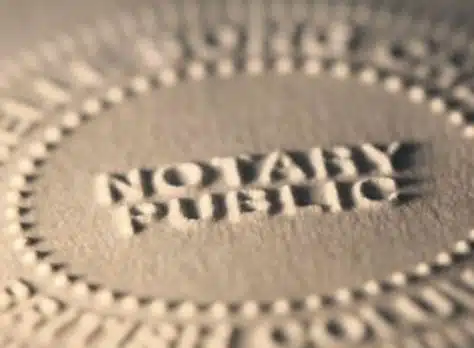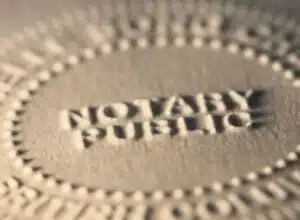If you’re like me, you know the importance of crossing your t’s and dotting your i’s, especially when it comes to legal matters. In the realm of affidavits, property deeds, and sworn statements, a Notary Public is your go-to person. But how can you be sure the notary you’re dealing with in Massachusetts is legit? Don’t worry; we’ve got you covered. In this comprehensive guide, we’ll walk you through the ins and outs of verifying a Notary Public in Massachusetts.
For those in a hurry: To verify a notary public in Massachusetts, your best bet is to call the Governor’s Council at (617) 725-4016 or refer to the Secretary of State’s Office online resources.
The ABCs of Notary Requirements in Massachusetts
Becoming a Notary Public isn’t something that happens overnight. In Massachusetts, you must be at least 18 years old, a legal resident, and your criminal record must be cleaner than a surgical suite. So when you’re looking to verify a notary, it helps to know these prerequisites as they set the foundation for their credibility.
The Wide World of Notary Responsibilities in Massachusetts
From witnessing your grandmother’s will to helping you close on your first home, the responsibilities of a Massachusetts Notary Public are diverse. They authenticate documents, administer oaths, and are the superheroes of paperwork, ensuring that fraud stays at bay. Knowing the extent of their powers will help you set realistic expectations.
The ID Game: What Notaries Should Ask For
Imagine showing up and the notary just takes your word for it that you are who you say you are. That’s not how it works. Legit notaries will ask for proper identification. In Massachusetts, this can range from a local driver’s license to a U.S. Military ID or even a foreign passport with the appropriate visa stamps. So, when you’re in the verification process, pay attention to the identification being asked for.
The Magic of the Notary Commission Number
Much like your Social Security number, a notary commission number in Massachusetts is a unique identifier. This special number is your key to verifying a notary’s legitimacy and can often be found stamped or written on the documents they notarize. Keep an eye out for it.
Step-by-Step: How to Verify a Notary Public in Massachusetts
Phone-a-Friend, or Rather, the Governor’s Council: Speed up the verification by ringing up the Governor’s Council at (617) 725-4016.
Check Online: The internet is your friend here. Use the Secretary of State’s Office online services for easy verification.
What You’re Looking For: Ensure their commission hasn’t expired and that they’re in full compliance with the state’s legal guidelines.
Extra Nuggets of Information
Can They Notarize Out-of-State? Technically, yes, but there are rules. Always check the fine print.
Is it Free? Ah, the age-old question! The answer is typically no; notaries usually charge a fee, so keep your wallet handy.
Online Notary Services: Cutting-edge tech has reached the notary world. As of 2023, you can find online notary services in Massachusetts.
What’s the Deal with Notary Acknowledgments in Massachusetts Estate Planning?
So, you’re diving into the world of estate planning in Massachusetts. Kudos to you for thinking ahead! You’ve probably heard that you’ll need some documents notarized. But what’s that all about? Let’s break it down.
The Nitty-Gritty of the Massachusetts Notary Acknowledgment Form
Okay, so this form is basically your new best friend when you’re signing legal docs. Think of the notary as the ultimate wingman—or wingwoman—making sure you’re really you and you actually want to sign the document. No funny business. Once they’re convinced, they’ll give your paperwork their John Hancock and stamp of approval.
The Legal Stuff You Need to Know
Now, there’s a rulebook for this stuff. In Massachusetts, it’s guided by a law called § 222:15. Yeah, it sounds like a robot name, but it’s the rule that tells everyone how this game is played. If you’re a stickler for details, there’s this thing called a Notary Journal you can get your hands on. It’s got all the nitty-gritty laws and guidelines you could ever want to know about notarization.
How Do I Get a Document Notarized?
Find a Notary: Look, you can find notaries everywhere. Banks, UPS stores, courthouses—you name it.
Set a Date: Give them a call, shoot them an email, or maybe even a text if they’re that cool. Just make sure you’ve got a time slot that works for both of you.
Show ’em Your ID: Yep, you’ll need to prove you’re really you. So don’t forget your driver’s license or passport.
Sign on the Dotted Line: Do your thing—sign that paper! The notary will be watching to make sure it’s all legit.
Finish Up the Form: Your notary will fill out the last bits of paperwork, and boom—you’re officially notarized in the state of Massachusetts.
Need to Check a Notary’s Creds?
If you’re the skeptical type, there’s no online system to look up a notary in Massachusetts—yet. But you can still call up the Public Records Division in the Secretary of the Commonwealth’s Office. Some local county clerks might also have info.
Filling Out the Form: It’s a Piece of Cake
This is the home stretch, people. The form’s pretty straightforward. You’ve got some blanks to fill in with the where and when, plus the names of you and your new notary BFF. Then, the notary will sign it, seal it, and you’re done!
Conclusion
Verification isn’t just for Twitter handles. When dealing with legal documents and identity-sensitive transactions, verifying your Notary Public in Massachusetts isn’t a step you should skip. Check their commission number, make sure they’re asking for proper ID, and when in doubt, consult state resources.
FAQ Section
What ID is needed for a notary in MA?
In Massachusetts, you have several options for identification. The most commonly used and accepted is a Massachusetts driver’s license. Additionally, a non-driver’s ID, U.S. or foreign passports, and U.S. Military IDs are also accepted. It’s essential to have a government-issued photo ID when you’re getting a document notarized.
How to double-check notarization in Massachusetts?
If you’re looking to verify the status of a notarized document in Massachusetts, you can call the Governor’s Council at (617) 725-4016. Additionally, the Secretary of State’s Office offers online verification tools. These resources help you confirm the legitimacy of the notarial act.
What’s a notary acknowledgment in Massachusetts?
A notary acknowledgment in Massachusetts serves as formal verification that the person signing a document appeared before a notary, confirmed their identity, and signed willingly. It’s not just a seal; it’s a security measure to validate the document and protect against fraud.
Can a Massachusetts notary notarize out-of-state?
Yes, a Massachusetts notary can perform notarial acts outside the state if the document is to be used or filed within Massachusetts. However, it’s crucial for the notary to understand the laws and regulations of the state where the notarization is happening.
Do you need to pay for notary services in Massachusetts?
Notary services usually have associated costs in Massachusetts. The fees depend on the nature of the document and the complexity of the notarial act. It’s advisable to inquire about fees beforehand to avoid surprises.


